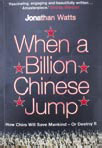Life and Leisure
A threat worse than a billion jumping Chinese
By Kelly Chung Dawson (China Daily)
Updated: 2010-12-08 11:11
 |
Large Medium Small |
NEW YORK - When author Jonathan Watts was a child, an adult attempted to explain the size of China with this awe-inspiring image: "If everyone in China jumped at the same time, the world would be jolted off its axis and go spinning into space."
As a result, he spent part of his childhood praying the Chinese population might never harness the power to jump simultaneously.
He has since grown out of this fearful phase, he assured an audience at the Asia Society in New York. Scientists now say the worst that could happen is a magnitude-2 earthquake, he said with a laugh.
But his new book, When a Billion Chinese Jump, attempts to illustrate how China's collective strength may otherwise affect the planet, and the Western precedents that have made these developments all but inevitable.
A culture of consumption, he argues, is the biggest threat we face.
"Healthy consumption should be the goal, but we - as a species - are far from it," he told China Daily. "Mankind increasingly resembles a swarm of locusts, as more and more of us consume an ever larger share of the world's resources.
"As a result, growth - in its conventional, material, nomic form - has become self-threatening."
Nowhere on Earth do we see the effects of that threat more than in China, which by nature of its size and power, has the most to both gain and lose.
The book is divided into four sections: Nature, Man, Imbalance and Alternatives, and follows his findings over a 96,560-kilometer (60,000-mile) trip that spanned most of China.

He begins in the southwestern provinces of Yunnan and Sichuan, the latter of which houses more species than all of North America. His travels end in Northeast China, with seemingly nothing before him but sand and sky.
"I started the book in Yunnan to show that China's not just smokestacks and big cities," Watts said. "There are places like this with true beauty.
"But I ended in the desert to say that we are moving farther and farther away from the former as a species, and I'm not just talking about China."
In between, as he ventures through provinces, cities and a range of landscapes, he explores man's impact and reinvention of nature, the potentially disastrous results of this reinvention and the use of science to combat these effects.
He makes persuasive arguments about China's enormous potential to utilize science in reversing the effects of globalization, but also illustrates the vast damage that has already been done: dried-up lakes, the extinction of the Yangtze dolphin, villages where cancer and HIV are rampant. But also: Huaxi, also known as the Number One Village in China as it is the country's wealthiest, rising standards of living, laboratories where world-changing experiments are conducted, and the cash-infused glitz of Shanghai.
Ultimately, Watts points to the prettiest, wealthiest parts of China to illustrate the root of a worldwide problem.
"Consumption is the elephant in the room," he said. "We look at pollution as a problem, but consumption is the problem.
"From an environmental point of view, it's a worry, but from an economic point of view, it's what everybody wants.
"More Chinese consumption will balance the trade deficit and help the world economy emerge from global recession."
This paradox in the global economic growth model has been forced to the forefront as a result of China's size and the timing of its development, he said.
"I think that a billion people in wealthy nations have already made a jump to an unsustainable lifestyle," he said.
"There are clearly billions behind China in India and South America and so forth, that want to make the same jump, and it's poised right there at the tipping point."
Watts believes China has a right to increase demand. Disease, cold and hunger make a higher standard of living necessary, but as consumption increases in major Chinese cities, the carbon footprint of an average Chinese citizen also increases.
In 2007, the World Wildlife Fund estimated that if everyone on Earth lived like the average Mr or Mrs Wang in China, the ecological budget would be balanced.
The same report estimated that if we were all to live like the average European, we would need three planets. And if we were all to live like the average American, we would need 4.5 planets.
"Nobody aspires downwards," Watts said. "Everyone aspires upwards. And I think China is now moving in that direction."
While Watts takes a pessimistic view, he is "not without hope".
"Most of the current trends point toward conflict within and between nations over the environment, but there is also a growing awareness of the problems," he said.
"As resources grow scarcer and the global population continues to rise, mankind must choose between international cooperation to conserve or nationalist competition to consume."
Watts advocates a widespread change in values: both economic and personal. Incentives for healthcare, education, public transport and culture may promote a shift toward a less materially consumptive society.